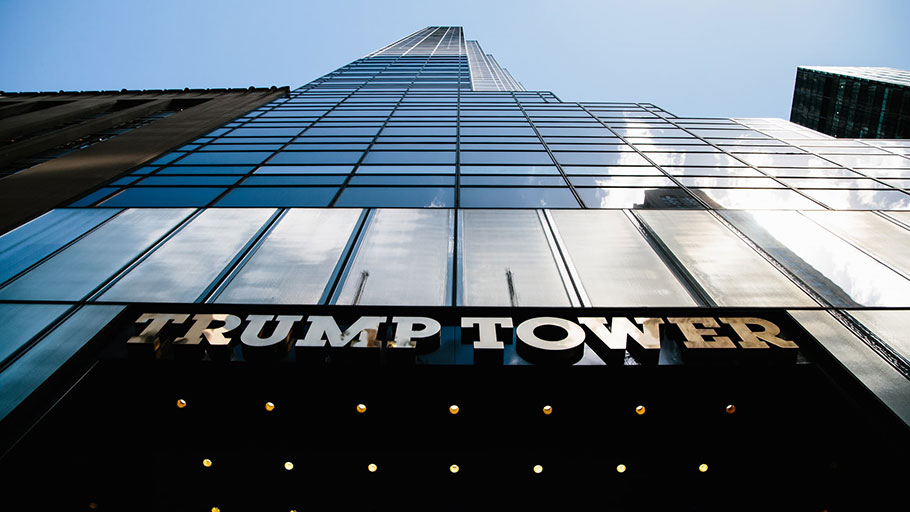‘Despite Europe’s commendable patience, its failure to understand what animates Trump has enabled him.’ Photograph: Alba Vigaray/EPA
Trump can easily weather broad sanctions on the US economy. But sanctions targeting his own companies will sting in a way that he cannot ignore
By Keith Ellison, The Guardian —
Donald Trump has opened the largest rift between the US and its European allies since George W Bush’s illegal invasion of Iraq. From the Paris accord, to the Iran nuclear deal, to pushing for the inclusion of Russia in a G8, the US president has demonstrated no regard for Europe’s security interests. Europe, in turn, has failed to understand how to deter Trump from sabotaging the transatlantic axis. Currently, Europe is considering sanctions and tariffs on US companies. It shouldn’t. To stop Trump and protect its interests, Europe should sanction Trump himself instead.
Since taking office, Trump has systematically undermined Europe while damaging the US national interest. Precisely because Washington’s European allies want to preserve the transatlantic relationship – unlike Trump – they have been hesitant to push back hard.
But in its caution, Europe has fallen for a false hope: the belief that Trump can be appeased, that he can be reasoned with and that he can be convinced to abandon his current path with logic. Essentially, Europe has failed to understand that Trump cares more about himself than his country. Like a dictator of a developing country, Trump is less concerned with the prosperity of American families or the country as a whole than with enriching himself and his family businesses.
Despite Europe’s commendable patience, its failure to understand what animates Trump has enabled him. For example, while Europe tried to salvage the Iran nuclear deal – an arms control agreement that made the world safer – Trump strung Europe along for months, misleading European partners that a compromise on the nuclear deal could be found when he had already made his decision months prior to kill the hard-fought agreement.
But while Europe has realized that it needs to meet pressure with pressure in order to salvage the transatlantic relationship, it is still focused on measures that are unlikely to succeed.
Counter-tariffs, clawback sanctions and other economic tools that Europe is considering are hardly sustainable, unlikely to force Trump to back down and will damage both the European Union and US economies. Perhaps more importantly, these economic measures will inflict hardship on millions of American workers who don’t support Trump’s agenda. Trump may even benefit from a rally-round-the-flag effect that often accompanies broad economic sanctions.
Sanctions targeting his own companies and wealth will sting in a way that he cannot ignore
A more effective approach would be to target Trump’s wallet. There are countless examples of how Trump is blatantly using the presidency to enrich himself. His controversial tax reform will reportedly save him and his family hundreds of millions of dollars. His son-in-law’s family openly uses their connection to Trump as a selling point to entice investors in China. His state department has publicly promoted Trump-owned private clubs. Foreign embassies have concluded that if they want access to Trump they should stay at his hotel in Washington. Curiously, Ivanka Trump secured seven trademarks in China around the same time Trump eased fines on a major Chinese telecommunications company. Most recently, Trump directed the commerce department to resolve its issues with sanctioned Chinese telecommunications company ZTE just two days after China floated a $500m loan to developers working on a Trump project.
Like most dictators, Trump can easily weather broad sanctions on the US economy. But sanctions targeting his own companies and wealth will sting in a way that he cannot ignore.
And that is exactly what Europe should do: don’t sanction or impose tariffs on Minnesotan companies that share no responsibility for Trump’s policies. Sanction Trump’s own companies and bar them from the EU market. For example, the EU and member states could prohibit officials from staying or holding events at Trump properties, or block the use of European money in financing Trump business and development deals. Just moving ahead on the planned placement of windmills near his Scottish golf course might be more likely to get Trump’s attention than a tax on motorcycles.
Targeting Trump’s companies is a more moral strategy. Broad sanctions and tariffs have high cost to the US and the EU, but little cost to Trump. Targeting Trump’s companies has little cost to the EU and US economies, but a high cost to Trump. Moreover, it will deprive Trump of any rally-round-the-flag-effect that broad sanctions tend to generate. In fact, if he tries to escalate, Americans would see that Trump is risking the broader US economy just to protect his own wealth.
Many in Congress will welcome this move, as it will shine a light on how Trump’s failure to put his companies in a blind trust has put the United States in a vulnerable position. And if it helps save the Iran nuclear deal or the Paris Climate Accord, the next administration and future generation of Americans will be grateful to European leaders for their courage.
Congressman Keith Ellison represents the fifth district of Minnesota















